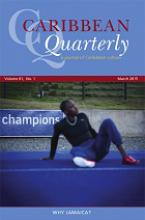
CQ 61, No. 1 (March 2015)
Submitted by DarienP on Wed, 04/29/2020 - 17:16

WHY JAMAICA?

Date Published:
March, 2015
ARTIST’S VOICE – Storm Saulter
The Athletes
The Work of Black American Women Anthropologists in Jamaica
A.Lynn Bolles
Abstract
Since the mid-twentieth century at least eleven African –American women anthropologists have carried out their doctoral research in Jamaica. What brings them to Jamaica? Women anthropologists carrying out research in Jamaica is the double-edged sword of public scrutiny, as they are gendered foreigners regardless of a shared phenotype. Discussions of their research and experiences are illustrative of a mutual understanding of reciprocity, respect and responsibility that serves as a shared bridge across African diasporan cultures.
It’s Culture, Not Genes:
Explaining Why Jamaican Sprinters Are the Fastest Humans on Earth
Orville Taylor
Abstract
This paper asserts that socio-cultural factors are the main causal elements in the historic speed of Jamaican athletes. While it gives some credence to the importance of genetic and other physiological influences, which it examines, it ultimately places the greatest weight on the non-biological factors. It argues that inasmuch as Jamaican athletes have been prominent in global track and field competitions since the 1940s, important socio-cultural changes since the 1990s have, coincided with other variables to make a major difference and give the Jamaican a distinct competitive advantage.
Influence of Reggae Music on the Economic Activities of EABIC Rastafarians in Jamaica
Shuji Kamimoto
Abstract
This study considers the relationship between dancehall reggae and the economic activities of Rastafarians while considering the perspective of Pratt’s ‘contact zone’. We can see traces of colonialism in reggae music, as reggae is distributed by global record companies, most of which are based in North America and Europe. As long as the Rastafari has been verbalising, visualising, and criticising the colonial power relationship to which Pratt alludes tension has emerged between reggae and Rastafarians. The complex relationship between reggae and Rastafarians can be considered as a product of the imagination of the globalised people.
Spinning Wheels: The Circular Evolution of Jive, Toasting, and Rap
Heather Augustyn
Abstract
Jive in America was the language of jitterbugs in Harlem swing clubs during the 1930s and 1940s, brought to the airwaves by radio deejays in cities throughout the country in the 1950s. When the broadcasts were picked up in Kingston, Jamaica, sound system toasters continued these vocalizations with their own flair and bravado. Hip hop pioneers then carried these linguistic stylings via immigration to the Bronx in the 1970s and formed the foundation for rap. The evolution of jive, toasting, and rap has been circular and is one of the ways that the genres of swing, ska, and hip hop have been influenced linguistically.
Hip-hop Culture: Bridging Gaps between Young Caribbean Citizens
Steve Gadet
The Caribbean region is known for its political and cultural diversity in spite of a common colonial past. However, their colonial heritage gave birth to similarities as well as deep divisions. After several decades of major regional ignorance, it has become a challenge to educate the young generations to live their lives including the neighbouring territories. To face that challenge, my observation in some Caribbean countries has led me to envision hip-hop culture as a way to bridge the gap and built a deeper regional awareness among various Caribbean young people. Hip-hop culture has become a channel of communication among young Caribbean citizens. It helped them to travel, to meet, to build lasting relationships and to become more aware of each other in spite of the political status and the language barriers.
The Poet and His Anima
Earl McKenzie
Abstract
On arriving at a Canadian university, a Jamaican philosophy student, who also writes poetry, attends his first beer garden in the residence where he is staying. There he glimpses a stunningly beautiful, dark-skinned, Oriental girl, and the experience is so intense he concludes that this is not an ordinary seeing of a beautiful woman, but an experience of some unusual significance. The story then describes his pursuit of her, their meeting and subsequent interactions over the years, which lead him to the conclusion that she is his Jungian anima. The story ends with the poems he wrote and gave her.
FEATURE ARTICLES
- The Work of Black American Women Anthropologists in Jamaica – A. Lynn Bolles
- It’s Culture, Not Genes: Explaining Why Jamaican Sprinters Are the Fastest Humans on Earth – Orville W. Taylor
- Influence of Reggae Music on the Economic Activities of EABIC Rastafarians in Jamaica – Shuji Kamimoto
- Spinning Wheels: The Circular Evolution of Jive, Toasting, and Rap – Heather Augustyn
- Hip-hop Culture: Bridging Gaps between Young Caribbean Citizens – Steve Gadet
PERSONAL ESSAY/POEMS
- The Poet and His Anima – St Hope Earl McKenzie
BOOK REVIEW ESSAY
Vreed-En Hoop to Carlton Gardens – P.J. Patterson
BOOK REVIEWS
- Jahlani Niaah and Erin MacLeod, eds., Let Us Start with Africa: Foundations of Rastafari Scholarship – reviewed by Desrine Bogle
- Y. Hume and A. Kamugisha, eds., Caribbean Cultural Thought: From Plantation to Diaspora – reviewed by Bridget Brereton
- Kate Quinn, ed., Black Power in the Caribbean – reviewed by F.S.J. Ledgister
- Daniel L. Schafer, Zephaniah Kingsley Jr. and the Atlantic World – reviewed by L. Alan Eyre
- Barbara Lalla, Uncle Brother – reviewed by Velma Pollard
- Suzanne Dracius, Climb to the Sky, trans. Jamie Davis – reviewed by Chantel DaCosta
